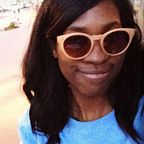What’s good, Medium?
10/25/2016
Charles Stephens’ piece on gentrification in Atlanta turns into a bittersweet goodbye letter to the city he once loved:
“ These days when I speak of Atlanta, it’s clear that I’m speaking of a place that no longer exists. A sort of ghost town. This is the Atlanta of my parents and grandparents, aunts and uncles, ancestors. This is an Atlanta that I’m not yet ready to let go of, nor ready to forget.
As the city continues to transform itself, into what I guess we will have to wait and see, I’ve found my memories fading. Gentrification if nothing else, is forgetting.”
Feminista Jones’ piece using the music of Black women like Mary J. Blige and Nina Simone to explore mental illness is a must read:
When are Black women allowed to be vulnerably open and express to others that we are suffering without the risk of people downplaying the intensity of our pain or dismissing us completely? When are we allowed to label our struggles as psychiatric disabilities without people chastising us for not following close enough to God or buying into “White people’s nonsense”? Rarely are we given space, as a Black woman, to say “I can’t move. I can’t breathe. I can’t see two feet in front of me. There are voices telling me things. I don’t want to be here anymore.” No one wants to hear that we might be in a psychological state that weakens us or renders us unable to serve them; we must be strong at all times and no one wants to hear otherwise.
But when Black women sing, we seem to be given permission to perform pain for others to consume. People demand that Black women singers emote suffering and go so far as to call it their “best” music. Happiness and joy don’t sell as well as suffering and crawling our ways up seemingly insurmountable hills. No, people are incredibly entertained by Black women’s suffering to the point of wishing ill upon us to see what the output will be.
Drake is taking heat for bringing up Kid Cudi’s mental illness on a recent diss-track. Did he go too far? Should any topic be off limits in a rap beef? Ciara Todd (no relation) breaks it down.
After I heard Drake’s shot at Cudi, I said on my Twitter that even though I felt like Drake was wrong for that, I could appreciate that he didn’t play nice. I come from an era where rap beefs were never about being kind. You were meant to make your opponent look as weak to the public as possible. It was supposed to hurt. There is no such thing as a “safe space” in rap.
But I also came from the same era where Jay’s lyrics about his sexual dalliances with Nas’s girl were — and still are — wrong. It wasn’t okay to air that type of dirty laundry out there, involving people that had nothing to do with it. There was a level of ethics. Screwed-up ethics but still.
But that barometer of acceptable rap beef conduct has changed. And rap has to catch up with that, whether it wants to or not. You can’t make light of suicidal attempts and not get lambasted for it. You can’t pull off an “Ether” in 2016 and get away with it. If Nas — or any rapper now — released something that called every body a ‘f*ggot’, folks would be out of here.
And that’s okay.
